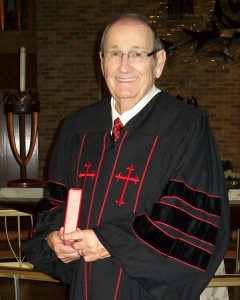
Words can be dangerous and can tear a person apart. Yet words can also be a real blessing when we use them to compliment or encourage someone, or to bring peace when a person is in despair. I remember so well when my Mama died. It was a blustery cold day in January as we gathered by the graveside on a red dirt hill in Decatur, Mississippi. My brother Clayton was sitting next to me and I was shivering. My brother and I had never been very close, one reason being our age difference. Suddenly, he took off his coat, put his arms around me and whispered, “I love you, brother.” That’s’ the only time he ever expressed himself in that way, but it made a lot of difference in me in a way that’s difficult to explain. It was a tender moment, to say the least. Words can do that, and more.
As I write, I received word that my brother-in-law, Buddy Ludlow, died in Biloxi, Mississippi. I will miss him, especially when we insulted each other (all in the context of good fun). The last time I saw him, he said to me: “Henry, do you know just how bad you are?” I responded, “No, but I think you ought to be in the ‘Hall of Shame’.” Our words deepened the bond of friendship.
I think about Joseph in the Old Testament, who could have let the words of his brother destroy him because they sold in to the Ishmeelites out of jealousy. Jealousy can be lethal. But Joseph held on to his integrity and kept his cool. Later on, he resisted the temptation to be with Potiphar’s wife. She had him put into prison for something he didn’t do. He found himself in a “pressure cooker” but resisted from all sides. What a wonderful story it is. And a great role model Joseph is. Read his story and be inspired.
I used to think that if words were in print, they must be true. Or, if someone said things in a certain authoritative way, then they were authentic. What a miss-assumption. Today, words are being thrown around—printed and verbal—that may or may not have any truth at all in them. Words can plant seeds of hatred and sway people at the ballot box. Words can send couples to the divorce court and they can also help couples celebrate marriages.
The late Rev. Fred Craddock writes about the power of words in his book “The Craft of Preaching” (published by the Chalice Press, St. Louis, Missouri). He said he was preaching in Marshfield, Missouri one time and he stayed in the home of a member who was an auctioneer. He auctioned cattle, among other things. He was invited to go to the barn where Mr. Case would auction off some cattle. When they got to the barn, it started raining. It was a boggy mess. “This rain is going to kill your auction,” Craddock said. “Oh, no; no better friend to a farm auction than the rain,” Case replied. Craddock asked, “How do you know?” “You watch. They will get out of their cars and just kind of tiptoe trying to find a dry place, but after a while, they will roll up their trouser legs and they will get careless. Then, I’ve got them,” said Case. They brought in some Holstein cows and tied one to a wagon. She looked old and tired. The auctioneer got the bidding up to $65.00. The cow was saggy, but the auctioneer took his can, hit the wagon wheel and said, “Whoa, whoa brothers and sisters, look at this here cow.” He continued, “This cow has calves all over the country putting rolls in the cheeks of children. How do you know that milk didn’t come from this here cow? Have you ever sat down to a cold glass of milk? Have you ever, on a Sunday evening, said, ‘Well I am still full from that good lunch, but I think I will just have a glass of milk and crumble some cornbread in it and sit down to rest?’ Do you know for sure that it wasn’t from this cow? Now, what am I bid for this here cow?” Craddock said he sold the cow for $350.00. The magic of words…powerful!
All of us are familiar with “excessive rhetoric”, a form of exaggeration. In literary circles, it’s called “hyperbole”. Usually, it is not to be taken literally. It can capture deep feelings and emotions. On the negative side, it can rip a person’s reputation to shreds, and people will believe it. On the positive side, however, it can be beautiful. For example, consider Ben Jonson’s poem to his wife, Celia, in which he wrote:
“Drink to me only with thine eyes,
And I will pledge with mine;
Or leave a kiss but in the cup,
And I’ll not look for wine.”
Or, consider the words in this hymn:
“Could we with ink the ocean fill.
And were the skies of parchment made,
Were every stalk on Earth a quill,
And every man a scribe by trade,
To write the love of God above,
Would drain the ocean dry.
Nor could the scroll contain the whole,
Though stretched from sky to sky.” (The Love of God)
Be careful with what you say. As someone put it, “Always taste your words before they leave your mouth.” Amen.









